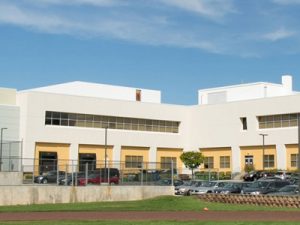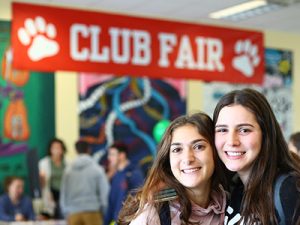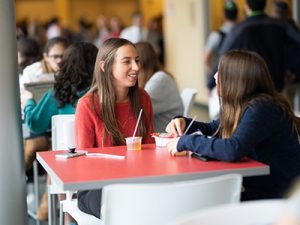English Electives Course Descriptions
Junior Year
Communication
Introduction to Communication covers the development and application of various modes of communicating. Starting with the origins of written and spoken language, the class moves forward to cover the philosophy, ethics and legal dimensions of communication in all its varied forms. From there, students learn about the communication industries and study mass media in its theoretical and actual forms.
Journalism
The journalism elective drives students to write, write, write. Students review the standard structure of an article and are required to write for publication on the Frisch off the Press website. Class sessions then work to sensitize students to other elements of Journalism including law, ethics and current practice.
Public Speaking
Some people are gifted with oratorical skills. Others can learn them. This course will help the student write and deliver an effective speech.
Senior Year
As we move to Senior year, students are given the opportunity to follow their own passion and choose a literature or writing course.
Each of these courses allow students to engage with the literature in new and meaningful ways. These courses continue to build on the student’s reading and writing skills. Using the themes as a guide, students analyze literature, participate in meaningful discussions, and write in multiple modes. These courses are designed to give the students voice and choice while preparing them for the next step in their educational journey.
Utopian and Dystopian Literature
The class will explore the 20th century’s descent from the meliorism inspired by the Enlightenment into into the dystopian pessimism provoked by the First World War. The reading for the class will include novels from the following list:
- Brave New World (summer reading)
- Survival in Auschwitz
- A Handmaid’s Tale
- Anthem
- A High Wind in Jamaica
- The Trial
- Lord of the Flies
- 1984
- Animal Farm
- Badenheim 1939
- Butcher’s Crossing
- The Plot Against America
- Gulliver’s Travels
- “Politics and the English Language”
- “A Modest Proposal”
The Matrix of Self: Searching for Meaning
The Western literary tradition documents the individual’s search for love and meaning through the shifting contexts of personal and social experience. Whether this search is posed in spiritual terms as redemption or in psychological terms as fulfillment, human relationships—determined by community, gender and even, internally, within the “matrix” of self—struggle to grasp moments of exhilaration and connection, or, at times, reconciliation and resignation. In this course, we will explore the individual’s search for meaning in the network of his/her relationships with the “Other” as they reflect the many aspects of the self, the individual’s internal, personal identity.
- Shakespeare, Othello
- Beckett, Waiting for Godot
- Goethe, The Sorrows of Young Werther
- Dostoevsky, Crime and Punishment
- Lawrence, Sons and Lovers
- Mann, Death in Venice
- Sartre, Nausea
- James, The Beast in the Jungle
- Joyce, Portrait of the Artist As a Young Man
- Goldstein, The Mind-Body Problem
- Selected poetry from Donne, Milton, Wordsworth, Coleridge, Browning, Yeats, Whitman, Pound and Eliot
Senior English: Fantasy and Science Fiction
George R. R. Martin writes “we read fantasy to find the colors again—to taste strong spices and hear the songs the Sirens sang. There is something old and true in fantasy that speaks to something deep within us, to the child who dreamed that one day he would hunt the forests of the night and feast beneath the hollow hills and find a love to last forever somewhere south of Oz and north of Shangri-La.”
Meanwhile, we live in a science fictional age. Space exploration, nanotechnology, bioengineering, robotics, environmental engineering and many other technological breakthroughs are changing how we see ourselves, how we interact with our environment, even how we define ourselves as a species. Science fiction explores technological, social and environmental change in human terms, investigating what it might mean— the hidden dangers and wondrous potential for human societies.
Lovers of both these genres call them by their umbrella term: Speculative Fiction. Fantasy and Science Fiction is a short story course sampling the the history of Speculative Fiction and examining the field as it is currently practiced. We will taste the major sub-genres and sample many major authors, including those who blend the two.
Writing
The Writing course will focus on envisioning and creating expository selections. Students will work through the process of pre-writing, drafting, revising and editing, with the teacher and with each other, in order to create pieces which explore the various styles and modes of non-fiction writing, from definition/classification, to narrative, through research methods. Analysis of examples of writing with a focus on rhetorical strategies will help sensitize students to the different presentations of argument. Frequent practice, in the form of thesis construction and writing and editing pieces of a variety of lengths, will constitute the majority of assessment opportunities.
Sports in Literature
Sports has played an important role in American fiction. It has served as the setting for novels such as The Natural, and The Universal Baseball Association or as the source of strength for the hero of a novel, as Joe DiMaggio does in The Old Man and the Sea. The class will focus on the use of sports as a metaphor and as a mythic setting by authors to portray universal themes.
The readings will come from the following list:
- The Great American Novel
- The Sun also Rises
- The Old Man and the Sea
- The Universal Baseball Association
- The Reivers
- Snow in August (summer reading)
- The Chosen
- Shoeless Joe
- Breaking Away
- Requiem for a Heavyweight
- “The Battler”
The Hyphenated American Experience
In this course students will study literature written by African-American, Hispanic- American, Asian-American, Jewish-American, Indian-American and Muslim-American authors to gain perspective on the American experience. This course will focus on the distinct literary styles and cultural influences of “hyphenated Americans.” Students will draw comparisons between the different “lived worlds” of these groups and contrast the experience of these groups with the myth of the American dream. Students will attempt to answer whether or not there is an American experience distinct from the hyphenated American experience. The readings and class discussions will ultimately attempt to address ethnic and racial stereotypes that are prevalent in media and pop culture.
Students will read both long and short works from authors like: Jumpha Lahiri, Junot Diaz, Chimamanda Ngozi Adichie, Nathan Englander, Julia Alvarez, Colson Whitehead, Alice Walker, Fae Myenne Ng, Philip Roth, G. Willow Wilson and Khaled Hosseini.
Banned Books
Live dangerously! This class will read and discuss books that have been banned at some point in time. Nothing is off-limits when one considers works that have been banned. Even the Bible has made it to the list! Are books meant to spark conversations? How important is the freedom of speech? Is censorship ever justified? This class will focus on the elements of the works that various societies find questionable. Topics to be discussed include race, gender, politics and economics.
Literature and Social Justice
Literature and Social Justice will focus on understanding issues that impact society both demographically and culturally. Students will read works of fiction and non-fiction that champion the marginalized in society and celebrate their triumphs. Topics to be discussed will include but are not limited to stereotypes, discrimination and prejudice. Students will examine the issues in the literature, respond critically and make informed decisions about their own world.
War, What is it Good For?
In this course students will read texts, both fiction and non-fiction, that illustrate the experience of war from multiple perspectives. The readings will include novels and memoirs written from the perspective of soldiers and civilians during wartime and post wartime. Students will be expected to complete all reading assignments, write four unit essays and one longer essay on a war film of the student’s choice.
Possible Readings: The Things They Carried, Jarhead, The Yellow Birds, Hiroshima, All Quiet on the Western Front, All the Light We Cannot See, The Lemon Tree.





